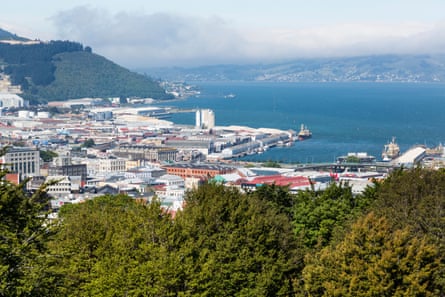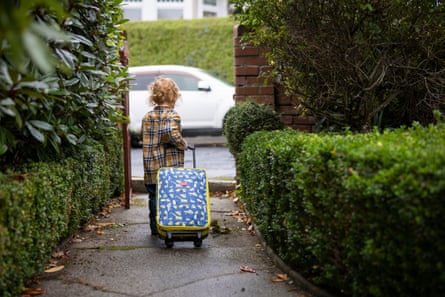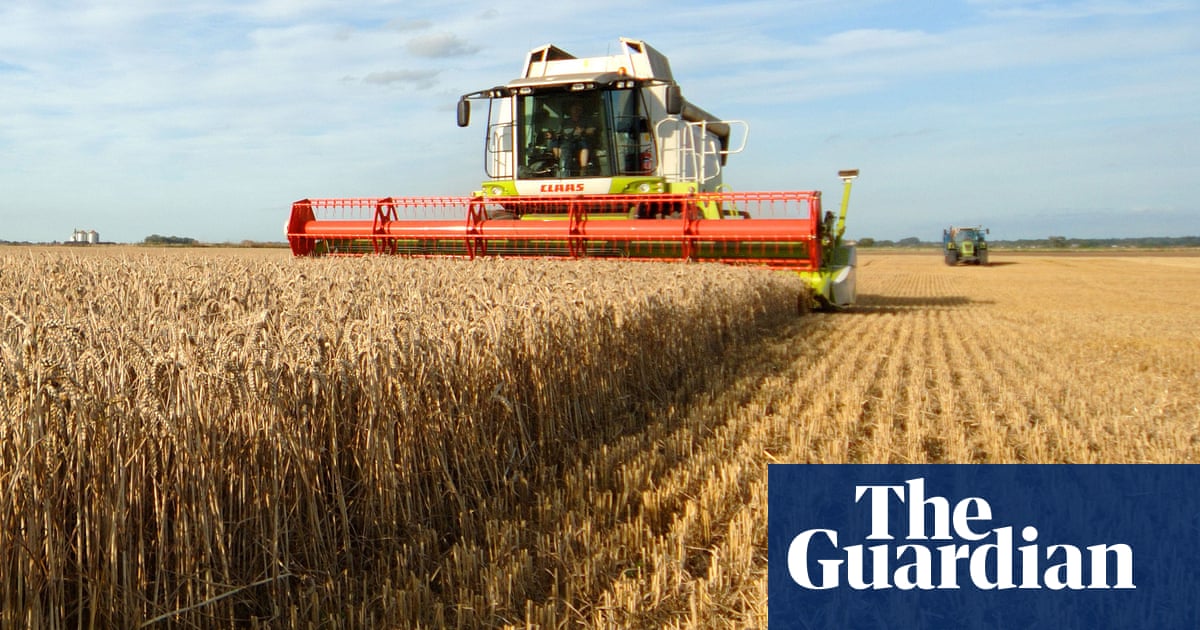She considers herself a diehard South Island girl, but Harriet Baker, 33, won’t be raising her children in the city where she’s spent most of her life.
“When we bought our house I said, ‘You’ll be taking me out of here in a casket,” she says, of the Dunedin home she and husband Cameron Baker, 33, sold last month.
“But the living costs just keep climbing, you’re working hard and you can’t put any money away – it felt like we were treading water.”
Their possessions are now winding their way to Western Australia, where the couple, their son Teddy, 2, and dog Hiccup, 8, relocated last week. Cameron will work as a heavy diesel mechanic in the mines while Harriet, formerly a public servant, will be the primary caregiver.

Harriet would like to give Teddy a Kiwi upbringing around his New Zealand-based grandparents, but she knows that might not happen.
“It does feel crazy that we’re leaving them. But that Australian income just flipped the switch for us.”
The Baker family are among a surge of departures from New Zealand, mostly fleeing a weak economy, in an exodus that is fuelling concern for the country’s future and has small towns scrambling for survival. Demographers are particularly worried as all ages of New Zealanders – not just young people – are packing their bags.
“I don’t know why we’re not talking about this more. We have a steep decline in fertility, a rapidly ageing population, and, out of Covid, we are seeing the rise and rise of departures,” says Massey University’s emeritus professor Paul Spoonley, a leading sociologist.
“Parts of New Zealand are beginning to empty out, they will suffer stagnation or are in decline. The question for me is – will the number of New Zealanders leaving the country begin to come back?” Spoonley says.
Workforce ‘hollowing out’
Over the past two years, tens of thousands of New Zealanders have left the country, surpassing the last spike in 2012. Record numbers of New Zealand migrants left the country through 2023 and into 2024. Figures remain high, with 69,100 leaving in the year to February 2025 – about 3% more than at this time last year.
Overall, more new migrants are still arriving in New Zealand than departing. But last year saw the biggest net loss of New Zealanders than any calendar year on record. About 56% of New Zealand emigrants – those planning to live overseas for a year or more – head to Australia, where the average pay rate is 26% higher.
For those aged 20-29, a backpacker-style overseas experience in Australia is a time-honoured rite of passage. They are still the biggest group leaving New Zealand but now, they are being followed by 30-39-year-olds and their children, as well as an unprecedented number of retirees – groups that are considered less likely to return.
“We talk about where the “centre of gravity” for a family is, and if you’ve got parents, grandchildren or adult children living elsewhere, you’re relocating your centre of gravity,” Spoonley said.

Experts are also worried about the impact on the workforce, now and in the future. This is in part due to working age people leaving New Zealand, and compounded by tighter immigration rules last year that are seeing fewer people coming on work visas.
“This is a hollowing out of this demographic of mid-career workers, who in reality do the bulk of the work,” said Simplicity chief economist Shamubeel Eaqub. “That’s the jaws of death closing, and then we have labour market problems.”
Small towns shrink
The high cost of living, along with wages, job conditions and difficulty finding employment were among the reasons given for moving by those spoken to by the Guardian. Many did not want to leave, but felt they were left with no option after struggling to get by.
It’s a story repeated in small towns across New Zealand.
In Ohakune, a North Island ski town, local Māori tribe (iwi) Ngāti Rangi are among those trying to figure out how to get people to stay. The area is in decline, with shuttered shops and ‘For Sale’ signs evidence of a population drop of almost a third since 1996 – a national trend demographers say shows no sign of slowing, as a majority of new migrants move to Auckland.
“This is not a good news story for provincial and small town Aotearoa and it’s happening gradually, town by town and region by region,” says Tahu Kukutai, a demographer and co-director for Māori research centre Ngā Pae o Te Maramatanga.
More recently in Ohakune, the closure of two mills by Winstone Pulp International in 2024 saw the loss of about 220 jobs. Jude Sinai, Ngāti Rangi’s redundancy support liaison, said about 10% of workers had moved overseas, others were struggling to find seasonal work or lower paying jobs.
“We’ve had new recruits who bought homes at the higher end of the market, they didn’t see this coming, now they’re trying to service a mortgage shearing or mowing lawns. They think; ‘Do I go overseas and try to make it happen there?’”
The iwi has launched business courses to try to upskill families, and is pushing for tourism businesses to employ more locals – anything to get them to stay.

Photograph: Chameleon Pictures/Alamy
“Trying to get public services here is already so difficult, and when you take the numbers out of the area you get less attention. School rolls drop, there are teacher layoffs, lack of healthcare. We’re doing everything we can to lessen the magnitude of that scarring,” Sinai says.
To boost the economy, the centre-right National party government has said it will cut new spending by $1bn to reduce borrowing and debt. Some economists say that could slow the recovery while Labour leader Chris Hipkins criticised spending reductions as an invitation to young New Zealanders to move overseas. Thousands of jobs have been cut from the public service since 2023.
Finance minister, Nicola Willis, rejected those claims and told the Guardian the government would increase spending overall and save money by cutting unnecessary services. Willis said she “wanted see more New Zealanders choosing to stay here”. She said young people leaving New Zealand was an ongoing challenge, which could be addressed by growing the economy.
“I am very concerned if New Zealanders don’t believe that they have good prospects in New Zealand. I want people to see that this is a place of enormous economic future and enormous social future.”

But those overseas can’t see what would make them move home. Waikauri Hirini, 27, was a social worker in the small town of Te Kuiti in the central North Island before moving to Perth to join three generations of her family who already live over there, and work as a bank teller.
“I started on $48,000 and I never got a pay rise, I had a high caseload, I was stressed,” she says.
“When I graduated I couldn’t wait to help my community, where I grew up, but I just became burnt out and I thought ‘I don’t want this to be my life anymore’.
“Now, we’re really settled. It would make me sad if I didn’t bring my children up back home, learning the Māori language and doing kapa haka, and that’s when we would think about going back. But what would we be going back to?”
For many who have moved to Australia and elsewhere the fact remains; they are better off.
“They’re willing to pay for good workers over here,” says surveyor Daniel Reed, 38, who moved to Townsville from a small North Island town with his wife and three young children last year.
“We’re putting $1000 away a fortnight and we enjoy our life, we’re not scraping by or wondering what the grocery bill is.” Leaving was hard, but their kids were already enjoying their new schools and lifestyles.
“They’ll always be Kiwis, but they know the Australian national anthem. I don’t know if they remember the New Zealand one.”

.png) 9 hours ago
11
9 hours ago
11













































